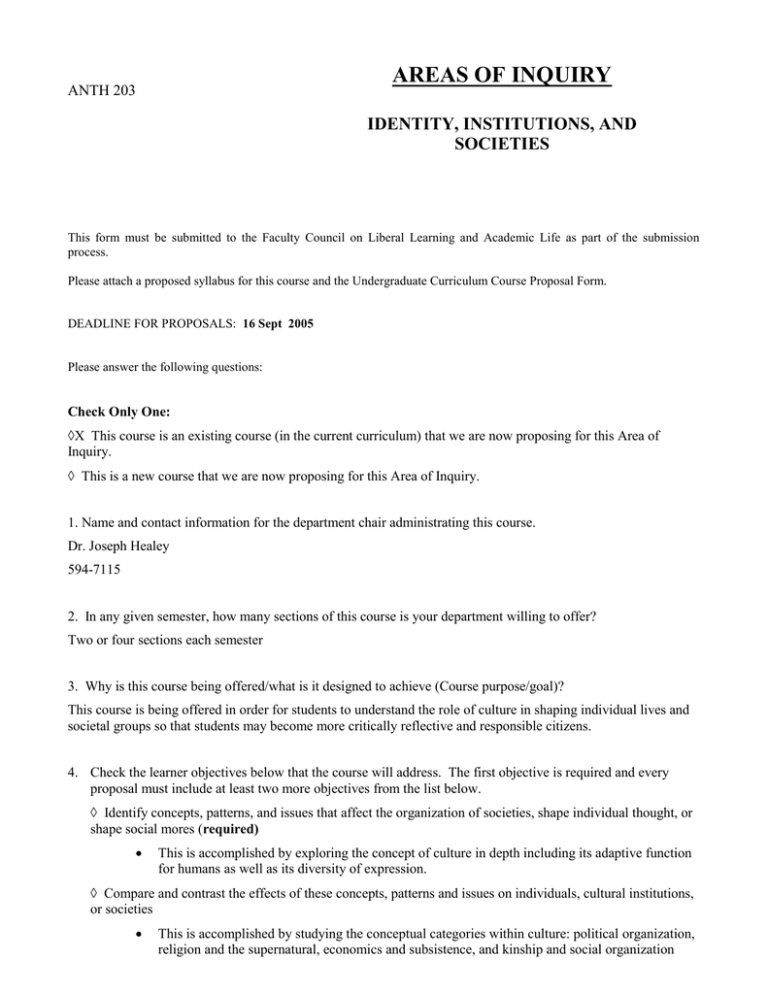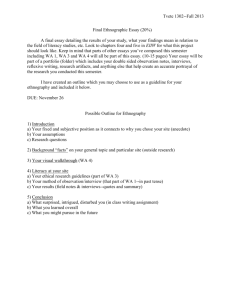AREAS OF INQUIRY IDENTITY, INSTITUTIONS, AND SOCIETIES
advertisement

AREAS OF INQUIRY ANTH 203 IDENTITY, INSTITUTIONS, AND SOCIETIES This form must be submitted to the Faculty Council on Liberal Learning and Academic Life as part of the submission process. Please attach a proposed syllabus for this course and the Undergraduate Curriculum Course Proposal Form. DEADLINE FOR PROPOSALS: 16 Sept 2005 Please answer the following questions: Check Only One: X This course is an existing course (in the current curriculum) that we are now proposing for this Area of Inquiry. This is a new course that we are now proposing for this Area of Inquiry. 1. Name and contact information for the department chair administrating this course. Dr. Joseph Healey 594-7115 2. In any given semester, how many sections of this course is your department willing to offer? Two or four sections each semester 3. Why is this course being offered/what is it designed to achieve (Course purpose/goal)? This course is being offered in order for students to understand the role of culture in shaping individual lives and societal groups so that students may become more critically reflective and responsible citizens. 4. Check the learner objectives below that the course will address. The first objective is required and every proposal must include at least two more objectives from the list below. Identify concepts, patterns, and issues that affect the organization of societies, shape individual thought, or shape social mores (required) This is accomplished by exploring the concept of culture in depth including its adaptive function for humans as well as its diversity of expression. Compare and contrast the effects of these concepts, patterns and issues on individuals, cultural institutions, or societies This is accomplished by studying the conceptual categories within culture: political organization, religion and the supernatural, economics and subsistence, and kinship and social organization Identify an institutional or societal structure (or structures) and its (or their) influence on individuals This is accomplished by examining the relationship between self and social group in reference to normative behavior and culture change among a variety of past and present cultures. Specifically, students will understand and reflect upon the ways in which kinship, religion, political and economic structures impact understandings of individual identity and normative behavior. Explain the fluid role of the individual within society (reflecting the multiple and sometimes contradictory roles of individuals within society) Recognize the influence of societal or cultural context on self and others as individuals Objectively and critically evaluate concepts of self and individuality 5. Briefly explain how this class addresses the above objectives. A course may cover more than three objectives. Please see (4.) above for answer 6. Course Assessment: Identify how this course will accomplish the above objectives (choose at least one): X Participating in class discussion and debate X Engaging in teamwork and other collaborative exercises X Writing analytical or evaluative papers, perhaps incorporating original research Making oral presentations Creating an artistic product or a performance X Participating in fieldwork Other means – please identify 7. Attach a proposed syllabus, which includes a statement of purpose, course objectives, and how these objectives will be accomplished. Please see attached. 8. Please identify and explain if this course contributes to the Foundations of Liberal Learning expectations for: Oral Communication Literacy: This course contributes to oral communication literacy insofar as students engage in class and group discussion and problem solving. Information Literacy: This course contributes to information literacy insofar as students must critically evaluate the ideas presented in the texts and ancillary readings and video. Writing Literacy: This course contributes to writing literacy insofar as half of their grade is based on writing assignments. 8. Explain how this course connects to Vision 2010 – the CNU Strategic Plan This course implements Vision 2010 because it contributes to an intellectually challenging and dynamic liberal learning curriculum and supports learning that is critical and innovative. The course does this by: Promoting learning that treats knowledge as vibrant and changing o Because a central focus of this course is understanding the role of culture in shaping human life and knowledge, students will come to understand that as culture is constantly changing, so therefore knowledge similarly changes and remains vibrant rather than remaining static. Cultivating analytical and integrative thinking within and across the disciplines o Several of the key concepts in this course such as kinship, political organization, spirituality, etc. can be studied from a variety of disciplinary perspectives, students are encouraged to draw upon diverse bodies of information and determine which provides them with the most explanatory force and meaning. Submission Checklist: By the deadline, submit a packet with the following documents to the Assistant Dean for Liberal Learning. Please submit in electronic and hard copy form. __X___ Area of Inquiry Course Proposal Form __X___ Syllabus for the Course _____ Undergraduate Curriculum Committee Course Proposal Form Anth 203: Human Culture and Society Introduction: This course engages students in the investigation of what being human means. We will start with the concept of “culture” and range the world to learn the various ways that people give meaning to their lives. We will learn how people that seem different can be surprisingly similar. At the same time, we will learn how those that are part of the same society can be very different. We will come to appreciate that all humans must be understood if we are to understand ourselves. Anthropology, as a discipline, has its roots in the social sciences and the humanities. As such, it is used as both a science and an art. Our readings reflect this dualism. We will use a textbook to become familiar with the conceptual tools anthropologists use and what these tools reveal about people. The textbook will be supplemented with 3 very readable ethnographies. The first is about rural whites in Maine, where my ancestry is traced, and explores issues of poverty and personal meaning. The second book is a popular, though old, ethnography about pygmies in the African Congo. Our final book is a short ethnography of how retired Filipino laborers, returning home after several decades of work over-seas, affected a small, rural community in the Philippines. Each ethnography will give us an idea of how anthropological research is conducted, written, and how this information can tell us something about our daily lives. The readings and lecture/discussions will be reinforced with several in-class videos. I will frequently draw from my experience for our lectures, activities, and class discussion. My area of specialty is Southeast Asia and I have conducted research in the Philippines. I come from an anthropologistfamily and was first exposed to fieldwork at the age of six. I am currently researching white ethnicity and local culture in Hawaii as well as the relationship between population, environment, and culture as it relates to food security. Each of the three ethnographies you will read will be reinforced with my personal experiences: working among foragers (similar in some ways to the Pygmies in The Forest People), as a member of extended Filipino families (relating to Emigrants, Entrepreneurs, and Evil Spirits), and coming from a white cultural heritage rooted in rural Maine since 1635 (I have relatives like the characters in The Beans of Egypt, Maine). I would also like to draw on your experiences to further enrich our class discussions. Grading: 25% midterm 25% final 15% essay on Griffith's book 15% observational essay 10% video review #1 10% video review #2 Examinations: There will be 2 examinations: a midterm and a final. The final will not be cumulative. They are both designed to take 90 minutes to complete though you will have two hours allotted to finish. Each exam will be comprised of multiple choice, identification, short answer, and short essay questions. The number of questions per chapter, video, and ethnography will be proportionate to how much time we spent on it in class. Attendance: I will take attendance at the start of every class meeting. Being in class promptly will greatly facilitate your learning and what you get out of this course. I also draw heavily from questions you bring to class for creating exam questions, so missing class will hurt your grade in more than one way. If you have a personal crisis or other cause for missing many class sessions, please talk to me ASAP so that we can make alternate plans for you. Class Participation Class participation is encouraged. There is nothing more boring than listening to a professor drone on and on, so stop me and ask questions. Provide your insight so that the rest of the class and I will know how you understand the assigned reading or video. I want to develop your critical thinking skills and promote an active learning environment, so sometimes we will break into groups. Although I do not give you a grade for how much you participate, other than being present, if your grade is borderline between two grades, and you have participated consistently and intelligently in class discussions, I will give you the higher grade. Essays: There will be four essays. The observational essay will be 4-5 pages long (typewritten) and will give you practice in writing about the physical and subjective details of the specified object or event. You will be given a handout two weeks prior to the essay’s due date detailing what you are supposed to write about. The goal of the exercise is to tune you in to how anthropologists must cultivate an eye and mind for detail if they are going to accurately describe and explain what they see and feel in the field. The two video reviews, each two-three pages, will require you to answer several questions and relate the content of the videos to what was covered in the textbook. You may choose any two assigned videos. The essay on Chute’s book, 4-5 pages, will relate the book's content to what was learned in the textbook. I will give you handouts to guide you on each of these essay assignments. Office Hours: I encourage you to take advantage of my office hours. However, please keep the following guidelines in mind: - When you stop by during office hours, please have specific questions and write them down beforehand. - If you want to discuss readings, bring the materials with you and have the appropriate sections marked. - If you are coming to discuss grades, be prepared to discuss ideas and not the number of points awarded or deducted. An appointment may be made whenever necessary. Texts: Haviland, William A. Cultural Anthropology. Eleventh Edition.: Chute, Carolyn The Beans of Egypt, Maine. Turnbull, Colin M. The Forest People: A Study of the Pygmies of the Congo. Griffiths, Stephen Emigrants, Entrepreneurs, and Evil Spirits: Life in a Philippine Village. There will be a handout for each ethnography with questions for you to think about while reading. These questions will help you integrate what you read in the textbook with the goings on of the ethnographies. Videos: The Nature of Culture Maya Lords of the Jungle Cricket the Trobriand Way Mini-Dragons: Thailand Becoming a Woman in Okriko Mississippi Masala Dadi’s Family Dead Birds Asante Market Women Aspirations Peoples of the Forest Voices of Immigrants Course Outline and Reading Assignments: Anthropology and the Study of Culture Read: Chapter 1 “The Nature of Anthropology” Read: Chapter 2 “The Nature of Culture” Video: The Nature of Culture Video: Maya Lords of the Jungle Lecture/Discussion on anthropological research and explanation Change and the Future Read: Chapter 15 “Cultural Change” Video: Cricket the Trobriand Way Observational Essay #1 Assignment Handed Out, Due July 8 Video: Mini-Dragons: Thailand Read: Chapter 16 “The Future of Humanity” Worldview and Cosmology Read: Chapter 4 “Language and Communication” Read: Chapter 5 “Growing Up Human” Read: Chapter 13 “Religion and the Supernatural” Video: Becoming a Woman in Okriko Kinship, Social Organization, Social Reproduction Read: Chapter 8 “Sex and Marriage” Video: Mississippi Masala Observational Essay Due Read: Chapter 10 “Kinship and Descent” Read: Chapter 9 “Family and Household” Video: Dadi’s Family Political and Economic Structures Midterm Exam Video: Dead Birds Read: Chapter 12 “Political Organization and Social Control” Read: Chapter 7 “Economic Systems” Video: Asante Market Women The Beans of Egypt, Maine Read: Ch.1-3 Read: Ch.4-8 Read: Ch.9-11 Video: Aspirations The Forest People Read: Chapters 1-6 Read: Chapters 7-15 Video: Peoples of the Forest Book Review of The Beans of Egypt, Maine Due Today Emigrants, Entrepreneurs, and Evil Spirits Read: Pages 1-33 Both Video Reviews are Due by Today Read: Pages 33-93 Video: Voices of Immigrants

